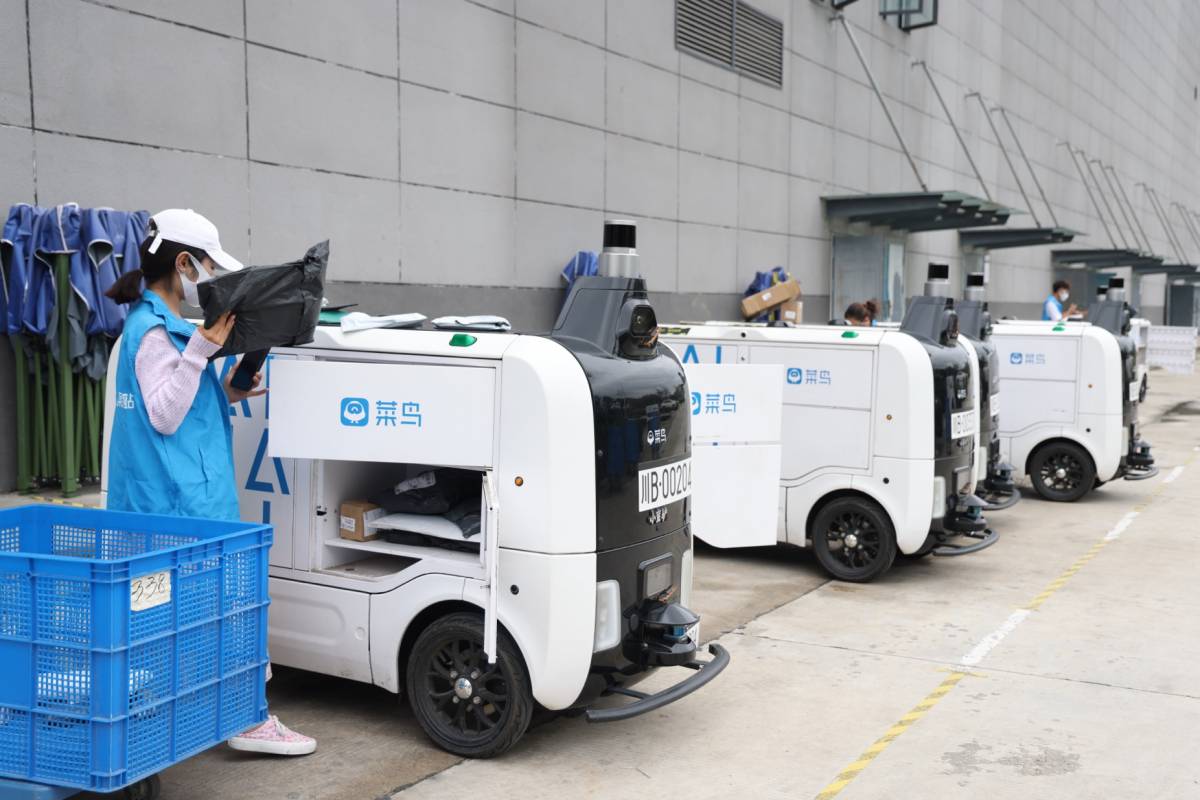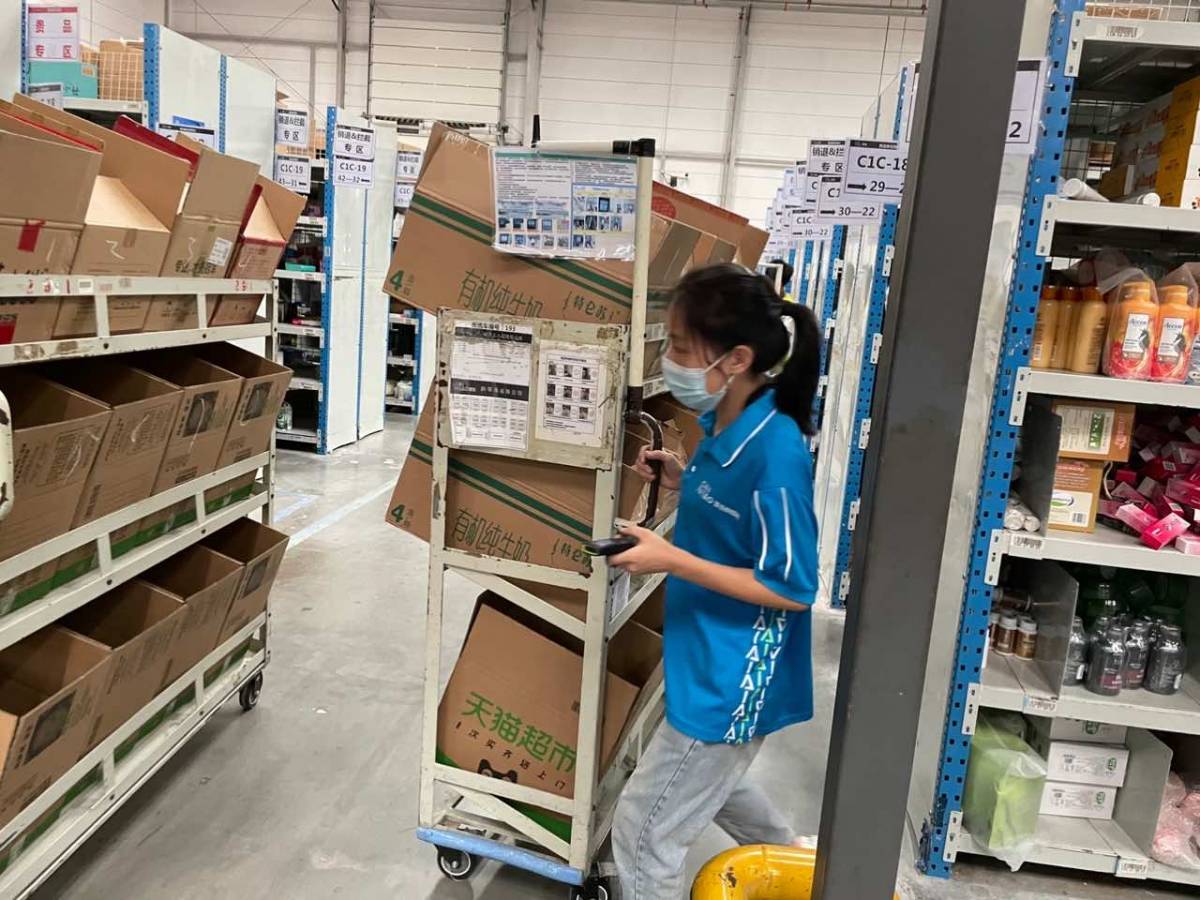
Alibaba's logistics robot fleet on a university campus in China. Photo Credit: Alibaba Group
This week, Alibaba Group’s logistics service Cainiao Network scaled up its operations in locked-down Chengdu as millions of the city’s residents battle a rise in COVID-19 cases.
In other news, the group’s “Xiaomanlv” delivery robots readied for another school year, helping students on university campuses across China receive their parcels and mail.
Meanwhile, Alibaba’s celebration of entrepreneurship in China wrapped up this week, but not before Alizila uncovered the top five consumer trends among Gen Z consumers.
Cainiao Offers Helping Hand in Chengdu
Cainiao mobilized resources to keep Chengdu supplied during a lockdown this week, as the city experienced an outbreak of COVID-19 cases that have forced its roughly 21.1 million citizens to stay home.
Chengdu, a major transport and commerce hub in southwest China, entered a city-wide lockdown on Thursday after logging over 766 coronavirus cases since Aug. 25.
The warehouse operated by Cainiao in Chengdu launched preparations earlier in the week to ensure its ability to supply Tmall Supermarket’s delivery routes in Chengdu, including bringing on additional staff to make deliveries and stock extra products.

“We have stretched the stocks from 40,000 to 50,000 product types, covering rice, flour, cooking oil, milk, biscuits, convenience food, and bottled water. There are over six million inventories here to supply Chengdu,” Tu Ping, manager at Cainiao’s warehouse, said in a Chinese interview.
On Thursday, city residents placed some 100,000 orders through Tmall Supermarket for food and other supplies. The orders will be fulfilled within 48 hours by Cainiao.
It’s Back To School For Alibaba’s Robots
University students are returning to school in China, and this year, Alibaba’s logistics robots are joining them.
Cainiao dispatched its autonomous delivery robots, called “Xiaomanlv,” to 60 more universities in China than the operation last school year, as the business unit restarted its on-campus logistics service stations for students and staff.
The unmanned logistics robots currently support the last-mile campus deliveries in over 300 universities across China.
“We received 6,000 to 7,000 parcels on the first day of school. The robot fleet is expected to handle one-fifth of the deliveries for us,” said Fang Ming, manager at the Cainiao logistics service station on Shenzhen University campus, in Mandarin.
Four “Xiaomanlv” vehicles are stationed on the campus of Shenzhen University, each delivering 500 parcels and running some 100 kilometers from 10 am to 9 pm daily.
On-campus deliveries peak at the beginning of each school year, with students sending their luggage or ordering necessities online to their dorms.
No Alcohol, Please! Top 5 Lifestyle Trends Among China’s Gen Z Reshaping Retail
China’s young consumers are taking the country’s retail landscape by storm as they hunt for fresh experiences and novel indulgences.
Once-obscure activities such as paddleboarding are fast becoming after-work pastimes. Meanwhile, a greater focus on wellness boosts retail categories such as non-alcoholic beverages.
“Young people are willing to express themselves, and the values they live by, through their hobbies,” Xu Yingfeng, co-founder of designer flying disc brand Yikun, a fast-growing startup from Hangzhou on the Eastern coast of China that is pivoting to capture this trend.
Many of these emerging trends were displayed earlier this month at Alibaba’s Maker Festival. As one of the most significant events of its kind in Asia, it has become a venue for Chinese startups to launch products and investors to discover consumer trends.
Discover the trends here
EV Automaker XPeng Takes Alibaba AI Computing Platform For Spin
Alibaba’s cloud computing arm launched a one-stop platform on Tuesday to accelerate artificial intelligence development by corporate clients.
The Apsara Intelligence Computing Platform shortens the training time for AI algorithms in data-intensive fields. Chinese electric vehicle manufacturer XPeng is one of the first companies to deploy it.
“As the demand for self-driving algorithm training increases, we need robust local and cloud-based computing power to provide support,” said XPeng Chairman and CEO He Xiaopeng.
Alibaba Cloud’s latest computing platform will increase the training speed of the XPeng autonomous driving model by nearly 170 times, from seven days to an hour.
Read more here
Alibaba Cuts Carbon Footprint by 620,000t With Use Of Renewables: Report
Alibaba said it saved 619,944 metric tons of carbon dioxide equivalent in emissions across 12 months by tapping cleaner energy sources as it strives to hit its carbon neutrality target.
That saving is on a par with the carbon dioxide generated by 12,915 U.S. households in a year, according to the platform company’s Environmental, Social and Governance (ESG) report published on Monday.
“We believe in our responsibility and capability to be a driver of positive change more than ever,” said Alibaba Group Chairman and CEO Daniel Zhang in the report.
Alibaba’s greenhouse gas (GHG) emissions totaled 13.249 million metric tons of carbon dioxide equivalent (MtCO2e) in the 12 months to March 31. In 2020, its emissions amounted to 9.51 million MtCO2e.
Learn more about Alibaba’s ESG report here




